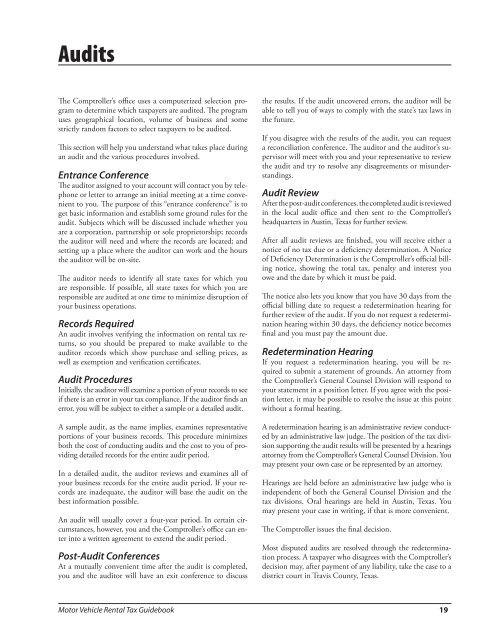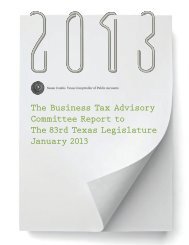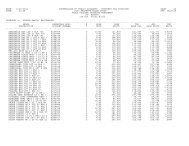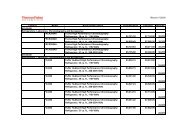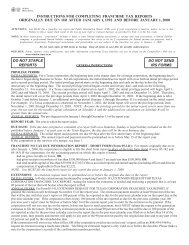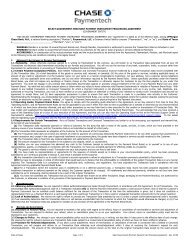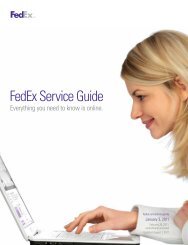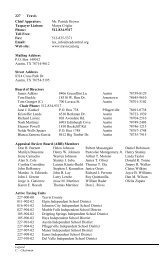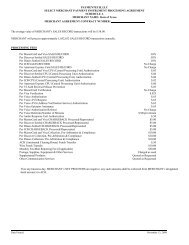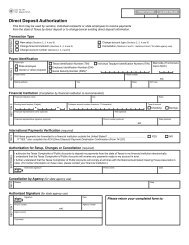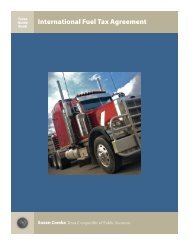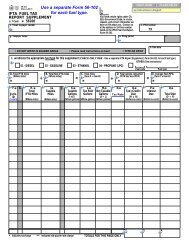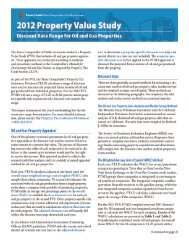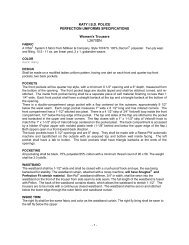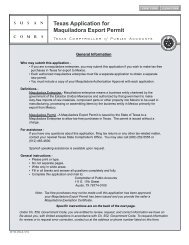96-143 Motor Vehicle Rental Tax Guidebook - Texas Comptroller of ...
96-143 Motor Vehicle Rental Tax Guidebook - Texas Comptroller of ...
96-143 Motor Vehicle Rental Tax Guidebook - Texas Comptroller of ...
Create successful ePaper yourself
Turn your PDF publications into a flip-book with our unique Google optimized e-Paper software.
Audits<br />
The <strong>Comptroller</strong>’s <strong>of</strong>fice uses a computerized selection program<br />
to determine which taxpayers are audited. The program<br />
uses geographical location, volume <strong>of</strong> business and some<br />
strictly random factors to select taxpayers to be audited.<br />
This section will help you understand what takes place during<br />
an audit and the various procedures involved.<br />
Entrance Conference<br />
The auditor assigned to your account will contact you by telephone<br />
or letter to arrange an initial meeting at a time convenient<br />
to you. The purpose <strong>of</strong> this “entrance conference” is to<br />
get basic information and establish some ground rules for the<br />
audit. Subjects which will be discussed include whether you<br />
are a corporation, partnership or sole proprietorship; records<br />
the auditor will need and where the records are located; and<br />
setting up a place where the auditor can work and the hours<br />
the auditor will be on-site.<br />
The auditor needs to identify all state taxes for which you<br />
are responsible. If possible, all state taxes for which you are<br />
responsible are audited at one time to minimize disruption <strong>of</strong><br />
your business operations.<br />
Records Required<br />
An audit involves verifying the information on rental tax returns,<br />
so you should be prepared to make available to the<br />
auditor records which show purchase and selling prices, as<br />
well as exemption and verification certificates.<br />
Audit Procedures<br />
Initially, the auditor will examine a portion <strong>of</strong> your records to see<br />
if there is an error in your tax compliance. If the auditor finds an<br />
error, you will be subject to either a sample or a detailed audit.<br />
A sample audit, as the name implies, examines representative<br />
portions <strong>of</strong> your business records. This procedure minimizes<br />
both the cost <strong>of</strong> conducting audits and the cost to you <strong>of</strong> providing<br />
detailed records for the entire audit period.<br />
In a detailed audit, the auditor reviews and examines all <strong>of</strong><br />
your business records for the entire audit period. If your records<br />
are inadequate, the auditor will base the audit on the<br />
best information possible.<br />
An audit will usually cover a four-year period. In certain circumstances,<br />
however, you and the <strong>Comptroller</strong>’s <strong>of</strong>fice can enter<br />
into a written agreement to extend the audit period.<br />
Post-Audit Conferences<br />
At a mutually convenient time after the audit is completed,<br />
you and the auditor will have an exit conference to discuss<br />
the results. If the audit uncovered errors, the auditor will be<br />
able to tell you <strong>of</strong> ways to comply with the state’s tax laws in<br />
the future.<br />
If you disagree with the results <strong>of</strong> the audit, you can request<br />
a reconciliation conference. The auditor and the auditor’s supervisor<br />
will meet with you and your representative to review<br />
the audit and try to resolve any disagreements or misunderstandings.<br />
Audit Review<br />
After the post-audit conferences, the completed audit is reviewed<br />
in the local audit <strong>of</strong>fice and then sent to the <strong>Comptroller</strong>’s<br />
headquarters in Austin, <strong>Texas</strong> for further review.<br />
After all audit reviews are finished, you will receive either a<br />
notice <strong>of</strong> no tax due or a deficiency determination. A Notice<br />
<strong>of</strong> Deficiency Determination is the <strong>Comptroller</strong>’s <strong>of</strong>ficial billing<br />
notice, showing the total tax, penalty and interest you<br />
owe and the date by which it must be paid.<br />
The notice also lets you know that you have 30 days from the<br />
<strong>of</strong>ficial billing date to request a redetermination hearing for<br />
further review <strong>of</strong> the audit. If you do not request a redetermination<br />
hearing within 30 days, the deficiency notice becomes<br />
final and you must pay the amount due.<br />
Redetermination Hearing<br />
If you request a redetermination hearing, you will be required<br />
to submit a statement <strong>of</strong> grounds. An attorney from<br />
the <strong>Comptroller</strong>’s General Counsel Division will respond to<br />
your statement in a position letter. If you agree with the position<br />
letter, it may be possible to resolve the issue at this point<br />
without a formal hearing.<br />
A redetermination hearing is an administrative review conducted<br />
by an administrative law judge. The position <strong>of</strong> the tax division<br />
supporting the audit results will be presented by a hearings<br />
attorney from the <strong>Comptroller</strong>’s General Counsel Division. You<br />
may present your own case or be represented by an attorney.<br />
Hearings are held before an administrative law judge who is<br />
independent <strong>of</strong> both the General Counsel Division and the<br />
tax divisions. Oral hearings are held in Austin, <strong>Texas</strong>. You<br />
may present your case in writing, if that is more convenient.<br />
The <strong>Comptroller</strong> issues the final decision.<br />
Most disputed audits are resolved through the redetermination<br />
process. A taxpayer who disagrees with the <strong>Comptroller</strong>’s<br />
decision may, after payment <strong>of</strong> any liability, take the case to a<br />
district court in Travis County, <strong>Texas</strong>.<br />
<strong>Motor</strong> <strong>Vehicle</strong> <strong>Rental</strong> <strong>Tax</strong> <strong>Guidebook</strong> 19


